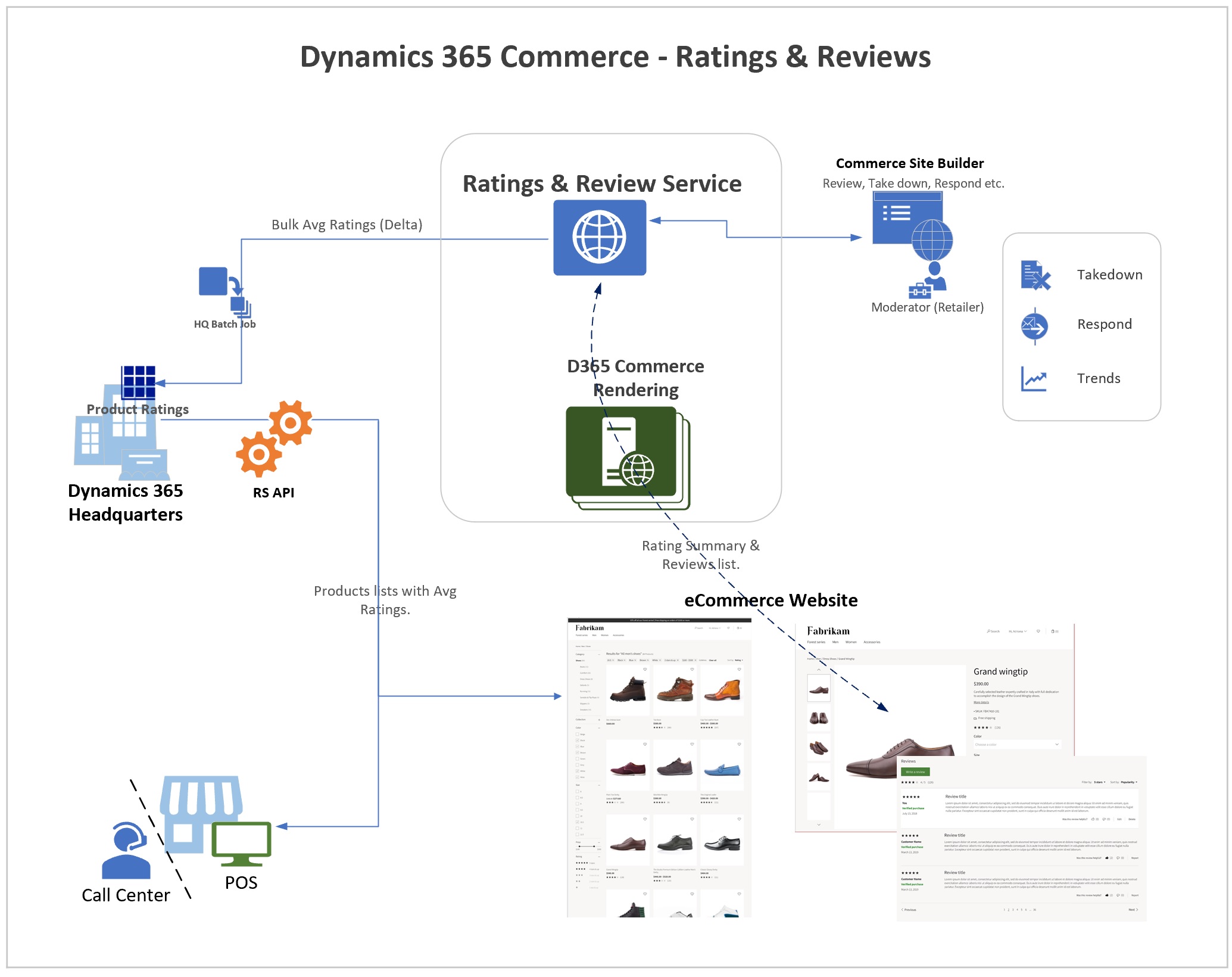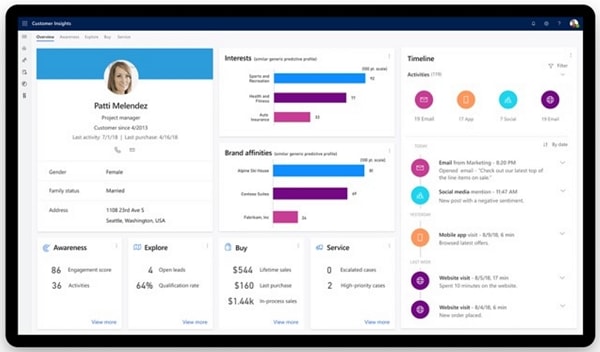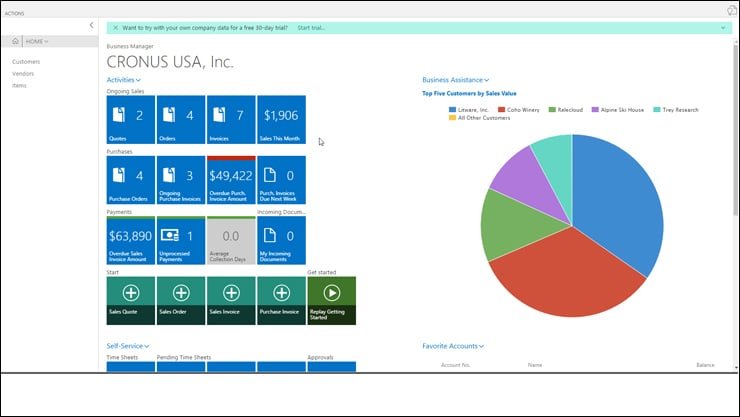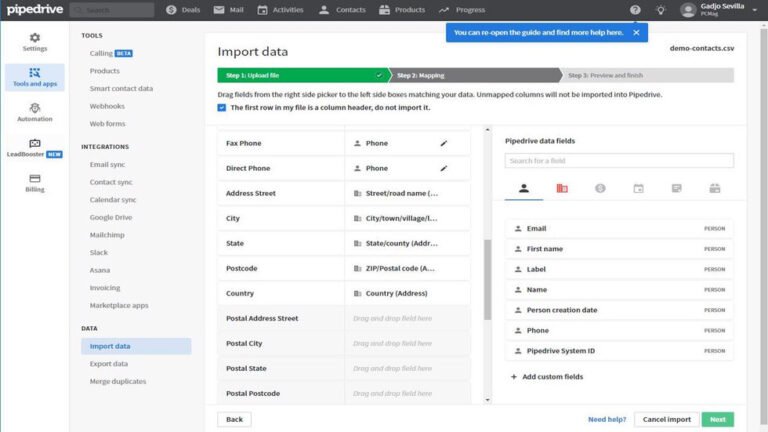Microsoft Dynamics 365 is a powerful integrated business management solution. It automates financial, customer relationship, and supply chain processes.
In this review, we explore how Dynamics 365 can transform your business operations. From AI-powered insights to seamless data integration, this suite promises to enhance efficiency and customer satisfaction. Whether you aim to boost sales, improve service, or streamline finance, Dynamics 365 offers comprehensive tools to meet your needs. With a 30-day free trial and various pricing plans, it’s accessible for businesses of all sizes. Explore the features and benefits of Dynamics 365 to see how it can support your business goals. For more details, visit the official Microsoft Dynamics 365 page.

Credit: learn.microsoft.com
Introduction To Dynamics 365
Microsoft Dynamics 365 is a powerful business management solution. It integrates CRM and ERP functionalities. This suite helps organizations adapt and innovate. It connects teams, processes, and data. This integration enhances customer experiences and boosts operational agility.
What Is Dynamics 365?
Microsoft Dynamics 365 is an AI-powered business application suite. It combines Customer Relationship Management (CRM) and Enterprise Resource Planning (ERP). This integration helps companies streamline operations. Dynamics 365 is designed to connect all aspects of your business. This results in better data management and decision-making.
Purpose And Core Functionality
Dynamics 365 serves several purposes:
- Enhance customer experiences
- Improve operational efficiency
- Boost sales and service quality
- Streamline financial management
- Increase supply chain agility
Core functionalities include:
| Feature | Description |
|---|---|
| AI-Powered Insights | Utilize Microsoft Copilot for built-in AI experiences at no extra cost. |
| Data Integration | Connect and access data from hundreds of sources for a comprehensive business overview. |
| Productivity Tools | Collaborate effectively using Microsoft Teams and Microsoft 365 integrations. |
| Low-Code Tools | Quickly adapt processes using Microsoft Power Platform in conjunction with Dynamics 365. |
These features work together to ensure seamless business operations. Dynamics 365 helps businesses manage all aspects of their operations efficiently.
Key Features Of Dynamics 365
Microsoft Dynamics 365 offers a comprehensive suite of features designed to enhance business operations. With seamless integration, advanced analytics, and customizable solutions, it is an ideal choice for modern organizations. Below, we explore the key features of this powerful business management tool.
Integrated Business Applications
Dynamics 365 integrates both CRM and ERP functionalities into a single platform. This integration helps connect teams, streamline processes, and centralize data. The result is enhanced operational agility and improved customer experiences.
- CRM: Manage customer interactions and relationships effectively.
- ERP: Automate financial, supply chain, and other critical operations.
- Unified Data: Access comprehensive business insights from one location.
Customizable And Scalable Solutions
Dynamics 365 offers highly customizable solutions to fit specific business needs. Organizations can easily scale the platform as they grow, ensuring continued efficiency and productivity.
- Low-Code Tools: Use Microsoft Power Platform for quick adaptations.
- Flexible Modules: Add or remove modules based on requirements.
- Scalability: Suitable for businesses of all sizes.
Advanced Analytics And Ai Capabilities
With built-in AI experiences, Dynamics 365 empowers businesses to make data-driven decisions. The AI-powered insights provide valuable information to optimize operations and enhance customer satisfaction.
- Microsoft Copilot: Utilize AI for enhanced decision-making.
- Predictive Analytics: Forecast trends and behaviors.
- Data Integration: Connect data from various sources for a holistic view.
Seamless Integration With Microsoft Products
Dynamics 365 integrates seamlessly with other Microsoft products like Microsoft Teams and Microsoft 365. This integration enhances productivity and collaboration across the organization.
- Microsoft Teams: Collaborate effectively with built-in tools.
- Microsoft 365: Leverage familiar productivity tools.
- Unified Platform: Ensure consistency across different applications.
Cloud-based Flexibility
As a cloud-based solution, Dynamics 365 offers flexibility and accessibility. Businesses can access their data and applications from anywhere, ensuring continuity and efficiency.
- Remote Access: Work from anywhere with internet connectivity.
- Scalable Storage: Adjust storage based on business needs.
- Security: Benefit from robust cloud security measures.
Dynamics 365 provides a powerful, integrated solution to manage business processes efficiently. Its key features offer businesses the tools needed to stay competitive and agile in today’s fast-paced market.
Pricing And Affordability Breakdown
Microsoft Dynamics 365 offers a versatile pricing model that caters to various business needs. Understanding the pricing structure is crucial for making an informed decision. Let’s explore the different pricing plans, their cost-effectiveness, and available subscription options.
Overview Of Pricing Plans
Dynamics 365 provides multiple pricing plans to suit diverse business requirements. Here’s a breakdown of the main plans:
| Plan | Features | Price (per user/month) |
|---|---|---|
| Customer Engagement Plan | Includes Sales, Customer Service, and Marketing modules | $115 |
| Unified Operations Plan | Includes Finance, Supply Chain Management, and Talent modules | $190 |
| Dynamics 365 Plan | All modules included | $210 |
Cost-effectiveness For Small To Large Businesses
Dynamics 365 is designed to be cost-effective for businesses of all sizes. Here are some key points:
- Small Businesses: Affordable plans that scale with growth.
- Medium Businesses: Comprehensive features at competitive prices.
- Large Enterprises: Complete suite with advanced functionalities.
For small businesses, the Customer Engagement Plan offers essential tools without breaking the bank. Medium businesses benefit from the Unified Operations Plan, which includes robust modules for operational efficiency. Large enterprises can leverage the full Dynamics 365 Plan for a seamless, integrated experience.
Subscription Options And Trial Periods
Microsoft Dynamics 365 offers flexible subscription options to meet different business needs. Key options include:
- Monthly Subscription
- Annual Subscription
Each subscription plan offers a 30-day free trial, allowing businesses to explore features before committing. This trial period helps users understand how Dynamics 365 can enhance their operations and drive growth.
To start your free trial or learn more about the subscription options, visit the official Microsoft Dynamics 365 page.

Credit: www.windwardstudios.com
Pros And Cons Of Dynamics 365
Microsoft Dynamics 365 is a robust business management solution. It combines CRM and ERP functionalities to streamline business operations. Let’s explore its advantages and limitations.
Advantages Based On Real-world Usage
Dynamics 365 offers several benefits that users appreciate:
- AI-Powered Insights: With built-in AI experiences, businesses can gain valuable insights at no extra cost.
- Data Integration: Connect data from multiple sources for a comprehensive view of business operations.
- Productivity Tools: Collaborate efficiently using Microsoft Teams and Microsoft 365 integrations.
- Low-Code Tools: Adapt processes quickly with the Microsoft Power Platform.
- Increased Sales: Personalize interactions to understand customers better and close more deals.
- Enhanced Service: Improve customer satisfaction with personalized service experiences.
- Financial Management: Move beyond traditional finance with innovative tools.
- Supply Chain Agility: Enhance supply chain responsiveness and efficiency.
- Cost Reduction: Customers report significant cost savings, up to 40% reduction in total ownership cost.
- Operational Efficiency: Streamline operations and improve data management.
Potential Drawbacks And Limitations
Despite its strengths, Dynamics 365 has some limitations:
- Complexity: The extensive features can be overwhelming for new users.
- Customization: Customizing the system to fit unique business needs may require expert help.
- Cost: While offering significant value, the pricing may be high for small businesses.
- Training: Adequate training and support are essential for effective usage.
- Integration Issues: Some users face challenges integrating Dynamics 365 with other legacy systems.
Recommendations For Ideal Users Or Scenarios
Microsoft Dynamics 365 is a versatile tool designed to enhance business management processes. To maximize its benefits, it is crucial to understand the ideal users and scenarios where this solution excels. Below we explore the best use cases, industries that benefit the most, and scenarios where Dynamics 365 shines.
Best Use Cases For Dynamics 365
- Customer Relationship Management (CRM): Dynamics 365 integrates CRM functionalities to help businesses understand and engage with customers more effectively.
- Enterprise Resource Planning (ERP): The system offers robust ERP capabilities to streamline operations and improve data management.
- AI-Powered Insights: Built-in AI experiences provide valuable insights, aiding in data-driven decision-making.
- Supply Chain Management: Enhances supply chain processes, making them more responsive and efficient.
- Financial Management: Innovative tools enable more advanced financial management beyond traditional methods.
Industries That Benefit The Most
| Industry | Benefits |
|---|---|
| Retail | Improved customer insights and personalized marketing strategies. |
| Manufacturing | Enhanced supply chain management and operational efficiency. |
| Finance | Advanced financial management and data integration. |
| Healthcare | Better patient management and data security. |
| Education | Streamlined administrative processes and improved data management. |
Scenarios Where Dynamics 365 Excels
- Data Integration: Connects and accesses data from various sources, providing a comprehensive business overview.
- Sales and Marketing: Personalized customer interactions lead to increased sales and enhanced marketing strategies.
- Operational Agility: Streamlines operations, making the organization more agile and responsive.
- Cost Reduction: Customers report up to 40% reduction in total cost of ownership.
- Collaborative Tools: Integrations with Microsoft Teams and Microsoft 365 enable seamless collaboration.
By leveraging the capabilities of Dynamics 365, organizations can transform their business processes, improve customer experiences, and achieve greater operational efficiency.

Credit: www.ocmsolution.com
Frequently Asked Questions
What Is Dynamics 365?
Dynamics 365 is a suite of enterprise resource planning (ERP) and customer relationship management (CRM) applications. It helps businesses manage operations, sales, and customer service.
How Does Dynamics 365 Work?
Dynamics 365 integrates with other Microsoft products and uses data analytics and AI. It provides insights and automation to improve business processes.
What Are The Benefits Of Dynamics 365?
Dynamics 365 offers scalability, flexibility, and integration with other tools. It enhances productivity and provides real-time data insights.
Is Dynamics 365 Suitable For Small Businesses?
Yes, Dynamics 365 is suitable for businesses of all sizes. It offers customizable solutions to meet the needs of small businesses.
Conclusion
Dynamics 365 offers powerful tools for business management. It integrates CRM and ERP functions seamlessly. With AI-powered insights, it enhances decision-making. Data integration boosts productivity and efficiency. Dynamics 365 improves sales, service, and financial management. It also enhances supply chain agility. The low-code tools are user-friendly and adaptable. Try the 30-day free trial to see its benefits firsthand. Learn more and start your trial at Microsoft Dynamics 365. Transform your business operations today.



